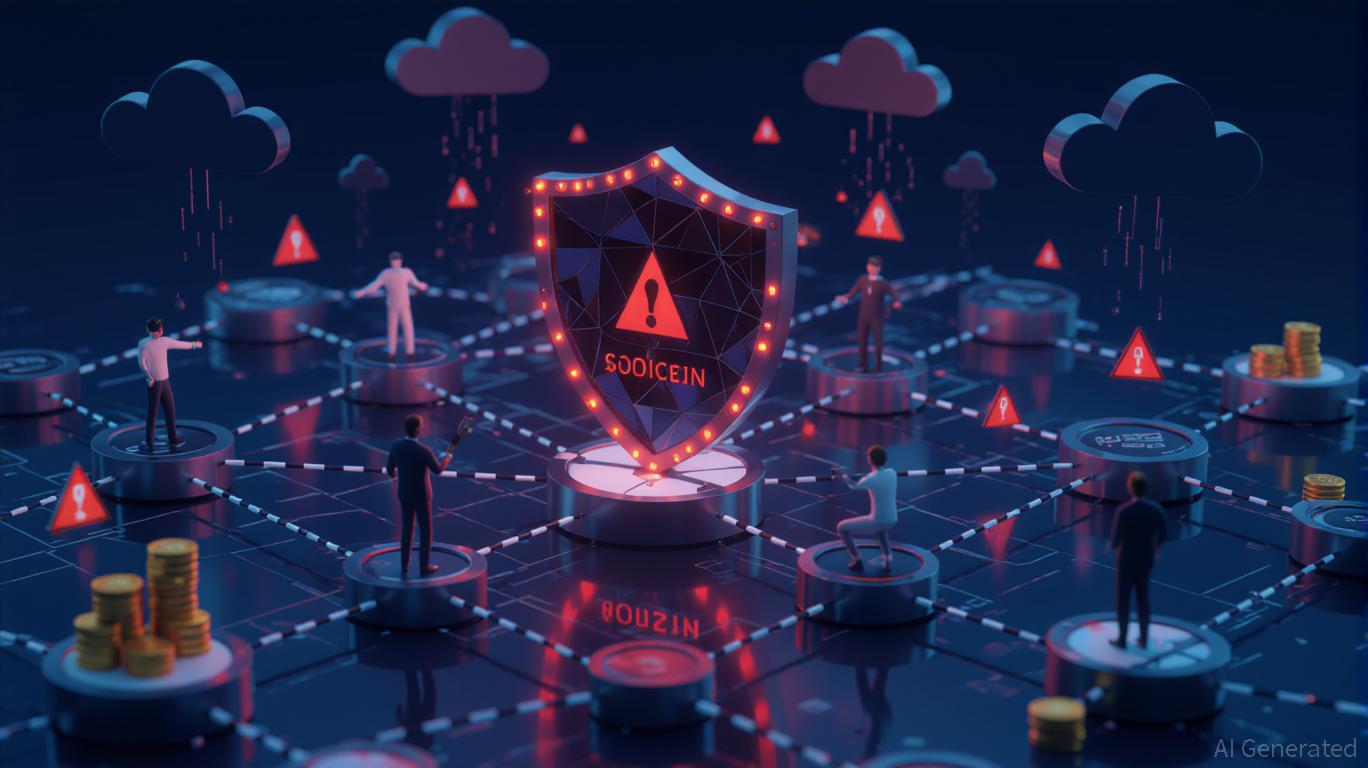COAI Token Fraud Unveiled and Its Impact on DeFi Safety: Evaluating Regulatory Preparedness and Shortcomings in Investor Safeguards within Developing Cryptocurrency Markets
- COAI token's 2025 collapse exposed DeFi vulnerabilities in emerging markets due to governance failures and regulatory ambiguity. - CLARITY Act's vague AI token definitions and U.S. regulators' conflicting classifications (securities vs. commodities) worsened market uncertainty. - Southeast Asia's crypto scams, including She Zhijiang's Myanmar operation, exploit weak governance and jurisdictional loopholes to defraud $10B annually. - IRS DeFi rules face legal challenges over privacy concerns, while platfo
Unclear Regulations and the CLARITY Act’s Mixed Impact
The proposed CLARITY Act made matters worse for the COAI token, leaving AI-related crypto projects in a state of legal uncertainty. Although the bill was intended to clarify what qualifies as an AI token, its ambiguous wording led to confusion, discouraged large investors, and increased market instability
At the same time, the Bank of England has moved quickly to update its stablecoin rules to match U.S. timelines, reflecting a worldwide effort to clarify regulations. Still, requirements for reserve audits and redemption processes—crucial for DeFi’s liquidity—remain controversial, as issuers find it difficult to meet compliance demands without sacrificing efficiency

Southeast Asia: Center of Scam Activity and Regulatory Shortcomings
Developing regions, especially Southeast Asia, have become major hubs for international crypto fraud. The U.S. Department of Justice (DOJ) launched the "Scam Center Strike Force" in 2025,
One notable example is She Zhijiang, a businessman born in China who was extradited to China in 2025 for operating a fraudulent compound in Myanmar’s Shwe Kokko region. His case highlights both the global reach of crypto scams and the gaps in enforcement: while authorities may shut down specific operations,
Investor Safeguards: Navigating Between Progress and Regulation
New DeFi rules from the IRS have led to court challenges, with blockchain supporters arguing that terms like "broker" and "trading front-end service" do not accurately reflect the decentralized nature of DeFi
Looking Ahead: Finding the Balance Between Progress and Protection
For DeFi to reach its full potential, regulators must take a more sophisticated approach. Developing economies need unified regulations to stop legal loopholes, while advanced markets should clarify definitions for AI tokens and stablecoins to minimize confusion. The downfall of the COAI token is a clear warning: without strong investor protections and international cooperation, the risks in DeFi will continue to overshadow its potential benefits.
Disclaimer: The content of this article solely reflects the author's opinion and does not represent the platform in any capacity. This article is not intended to serve as a reference for making investment decisions.
You may also like
Bitcoin News Update: Decentralized tBTC Bridge Competes with Centralized Alternatives in the Battle for Bitcoin Liquidity
- Threshold Network upgrades tBTC bridge to unlock $500B institutional Bitcoin liquidity for DeFi, enabling single-transaction minting to Ethereum , Arbitrum, and Base without gas fees. - Competitors like WBTC ($13B market cap) expand to Hedera , leveraging institutional-grade security and MEV-resistant infrastructure to challenge Threshold's decentralized model. - Threshold's 51-of-100 threshold signing model eliminates custodial risks, contrasting with WBTC/renBTC's centralized custodians and attracting

Solana News Update: DATs Initiate Buybacks to Narrow NAV-Price Gap Amid Market Volatility
- Upexi Inc. authorizes $50M stock buyback to boost shareholder value amid crypto market volatility. - DATs like Upexi trade below NAV (0.68 mNAV) as broader market pressures drive discounted valuations. - Industry trend sees firms including Forward Industries ($1B buyback) using repurchases to stabilize equity. - Analysts warn mass buybacks could trigger market unwinds, though Upexi maintains 1.74 current ratio liquidity. - Strategy reflects DATs' dual role as value stores and yield generators through sta
Trump’s Wall Street Fundraiser Sparks Renewed Debate Over Deregulation and Regulatory Oversight Following Trade Finance Crisis
- Trump dined with Wall Street leaders amid First Brands' $3B trade finance collapse, exposing non-bank lending risks and triggering calls for stricter oversight. - Jefferies faces scrutiny over $3B in tied debt as its stock fell 19%, while JPMorgan's Dimon warned of systemic gaps in non-bank lending oversight. - Trump's 50-year mortgage proposal sparked debate, with critics fearing "debt for life," while a 42-day government shutdown worsened market uncertainty. - The administration's deregulatory agenda c
Digital Identity, No Data Required: ZK Protocol Secures $9M to Champion a Privacy-Centric Tomorrow
- Self Labs raised $9M in seed funding led by Greenfield Capital and SoftBank, with participation from Web3 leaders like Sreeram Kannan and Sandeep Nailwal. - The ZK-based platform enables privacy-preserving identity verification using zero-knowledge proofs and supports 129 countries' biometric passports and India's Aadhaar system. - A points-based rewards program incentivizes on-chain verification, while integrations with Google, Aave , and Velodrome expand use cases like token distribution and age checks
